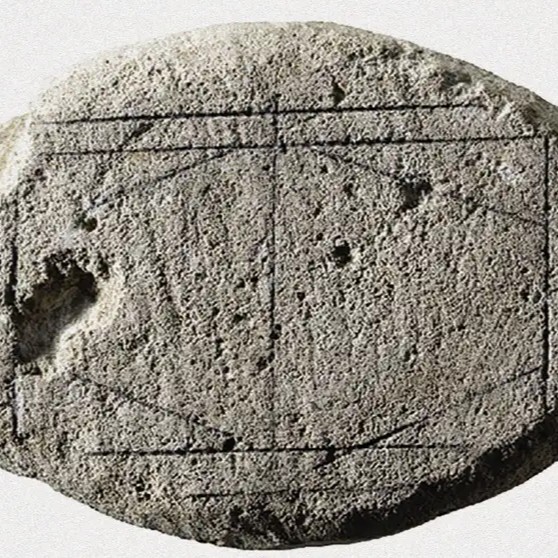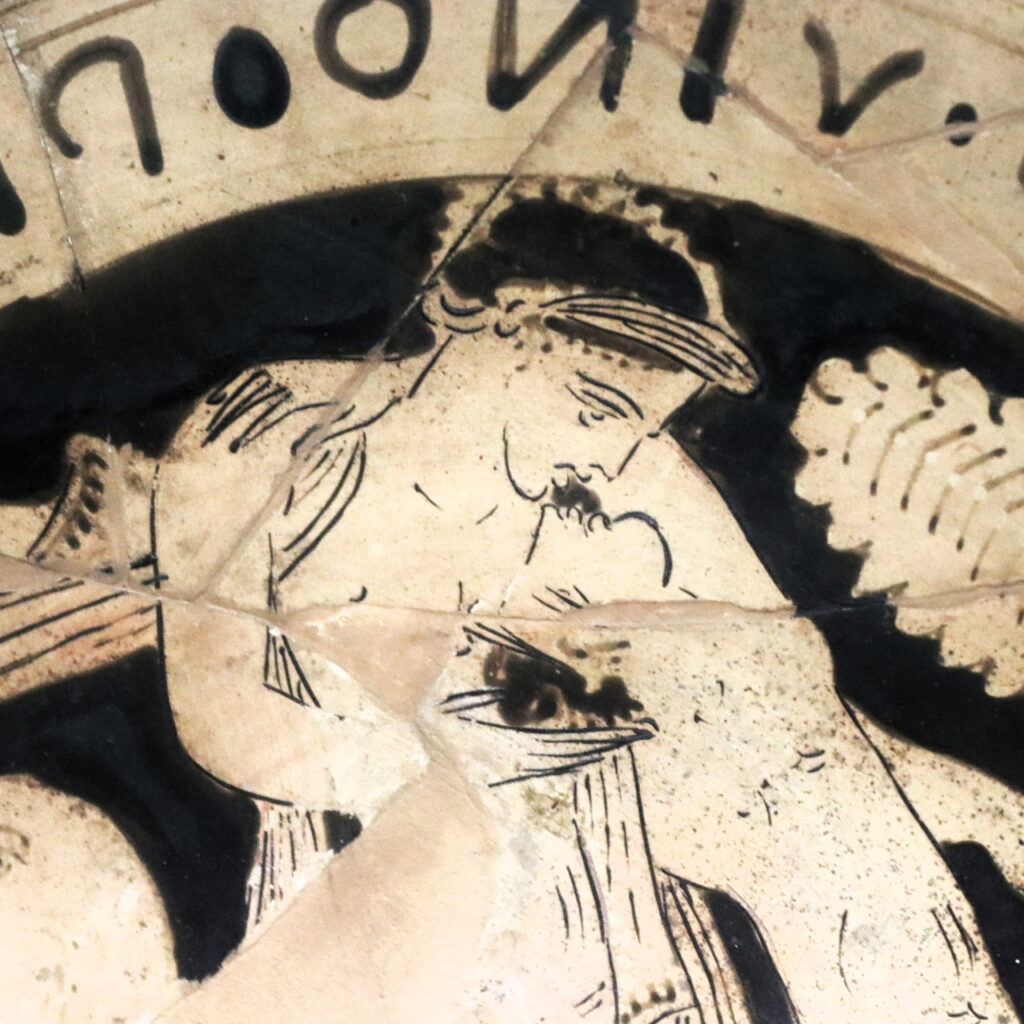Translated from french (please notify us of errors)

There are virtually identical verses in Ovid’s Art of Love and his Sorrows. Yet everything has changed. Between these two works, relegation far from Rome radically transformed the Roman poet’s vision of games and their place in society.
“A small board contains three pebbles on each side, where victory consists in having aligned one’s own.” This description of terni lapilli appears almost word for word in two works by Ovid[1]. But the context could not be more different.
The art of seduction through games
In book 3 of the Art of Love, Ovid dispenses his advice to Roman women eager to win men’s hearts. Games occupy a place of honour in a passage of thirty-eight verses (349-386). He encourages women to “practise a thousand games; it is shameful for a young woman not to know how to play: in playing, love is often prepared”[2].
For the poet, games constitute a veritable art of living. Dance, knucklebones, dice, the game of brigands (ludus latrunculorum), ball in a net, terni lapilli: Ovid draws up a detailed catalogue of six ludic activities that every cultured woman must master. These entertainments are not mere pastimes, but refined tools of seduction.
Games become a privileged relational medium. Ovid invites us to understand that it is in these moments of relaxation that true personalities are revealed.
But already, the poet clearly sees that games can also reveal weaknesses: anger, cupidity, disputes. He notes having “often seen cheeks wet with tears”[3].
Relegation changes everything
In the Sorrows, Ovid, relegated* to Tomis for reasons that remain mysterious (carmen et error – “a poem and an error”[4], he says), takes up exactly the same games in a passage of thirty verses (485-514). But this time, it is to defend himself against them.
The approach is radically different. Games are no longer arts of seduction, but examples of frivolity that other authors have treated without being troubled. Ovid argues that “others have written treatises on games of chance”[5], and that “all these games are wont to make us lose our time, a precious thing”[6].
Time becomes the key. What was once an investment in the art of pleasing becomes sterile loss. The poet deplores with bitterness: “deceived by these examples, I did not make sad verses, but sad punishment has followed our jests”[7].
A revealing reversal
This strategy reveals Ovid’s rhetorical skill. In the Sorrows, he transforms his defence into an argument of proportionality: since other authors have been able to write with impunity on “frivolous” subjects like games of chance, why should he alone be punished for having written the Ars amatoria, his manual of seduction?
The political context explains the gravity of the accusation. Augustus had promulgated laws on marriage (lex Iulia de adulteriis, 18 BC) to restore Roman morality and combat the decadence of morals. The Ars amatoria gave recipes for circumventing these laws, teaching notably how to deceive husbands and guardians, seduce married women and escape surveillance. This direct transgression of Augustan moral policy made Ovid’s work particularly problematic.
Ovid does not deny that his Art of Love is light or provocative. Rather, he contests the arbitrary nature of his condemnation. By placing his erotic poetry in the same category as ludic treatises – both belonging to entertainment literature – he highlights the inconsistency of the treatment reserved for him. If Rome tolerates teaching the subtleties of dice games, why would it not tolerate teaching those of seduction?
This comparison allows Ovid to avoid a denial of guilt (dangerous in the face of Augustus) whilst denouncing an inequality of treatment in the literary standards of the era.
Even more revealing: Ovid maintains his conviction that games reveal true human nature. Whether valorised (Art of Love) or deprecated (Sorrows), they remain a mirror of the soul. This anthropological constant makes Ovid a modern observer of ludic psychology.
A contrasted literary tradition
Ovid is not the only Latin author to evoke board games in his works, but his approach reveals a certain originality. Among his contemporaries and predecessors, games serve other literary functions.
For Seneca, the Stoic philosopher, ludus latrunculorum becomes a moral metaphor in his Letters to Lucilius. Criticising the “very clever arguments” that distract from the essential, he evokes one who “looks at the latrunculi board to know how an obstructed piece can get out” instead of running to extinguish the fire in his house[8]. The game illustrates what must be avoided: wasting time on trifles when the urgency is true philosophy.
At the opposite extreme, Martial in his Epigrams celebrates games as objects of worldly sociability. His verse labels for Saturnalia gifts mention the tabula lusoria where “the two-coloured pawn perishes between two twin enemies” and the calculi that serve for “combats of insidious brigands”[9].
In this same worldly vein, the anonymous poet of the Laus Pisonis develops an entire scene of latrunculi where “wars are conducted with glass soldiers, now the whites bind the blacks, now the black binds the whites”[10]. This detailed description aims to show the urbanitas of a great lord for whom playing well forms part of drawing-room virtues.
Suetonius adopts a different perspective by using games to sketch imperial portraits. In his Life of Claudius, he notes that the emperor “played dice with the greatest passion, and even published a book on this art; he was in the habit of playing even whilst travelling, having adapted his chariot and his game board so that play would not be disturbed”[11]. Here, ludic passion becomes a trait characterising the prince’s personality.
Ovid’s originality
Faced with these varied uses –moral metaphor in Seneca, social marker in Martial and in the Laus Pisonis, biographical trait in Suetonius– Ovid develops a singular approach. Despite very different contexts in the Art of Love and the Sorrows, he makes games a psychological revealer: the tool that unveils the true nature of individuals beneath the social veneer. “Our naked hearts show themselves through games,” he observes with thoroughly modern perspicacity.
* In 8 AD, by a simple edict of Augustus, Ovid is relegated (relegatus) to Tomis, on the Euxine Sea. Unlike exile, which deprives one of citizenship and possessions, relegation maintains his civic rights and his fortune: he remains free to write and correspond, but must reside far from Rome.
[1] Ars amatoria 3, 365-366 et Tristia 2, 499-500.
[2] Ars amatoria 3, 367-368
[3] Ars amatoria 3, 378
[4] Tristia II, 207–208: Perdiderint cum me duo crimina, carmen et error, / alterius facti culpa silenda mihi
[5] Tristia 2, 489
[6] Tristia 2, 502
[7] Tristia 2, 511-512
[8] Seneca, Letters to Lucilius 117, 30: tabulam latrunculariam prospicit ut sciat quomodo alligatus exeat calculus
[9] Martial, Apophoreta 14.17-18: Calculus hac gemino discolor hoste perit et Insidiosorum si ludis bella latronum
[10] Laus Pisonis vv. 193-194: vitreo peraguntur milite bella, / ut niveos nigros, nunc et niger alliget albos
[11] Suetonius, Life of Claudius 33: Aleam studiosissime lusit, de cuius arte librum quoque emisit
Other articles in English from the Nunc est bibendum blog








